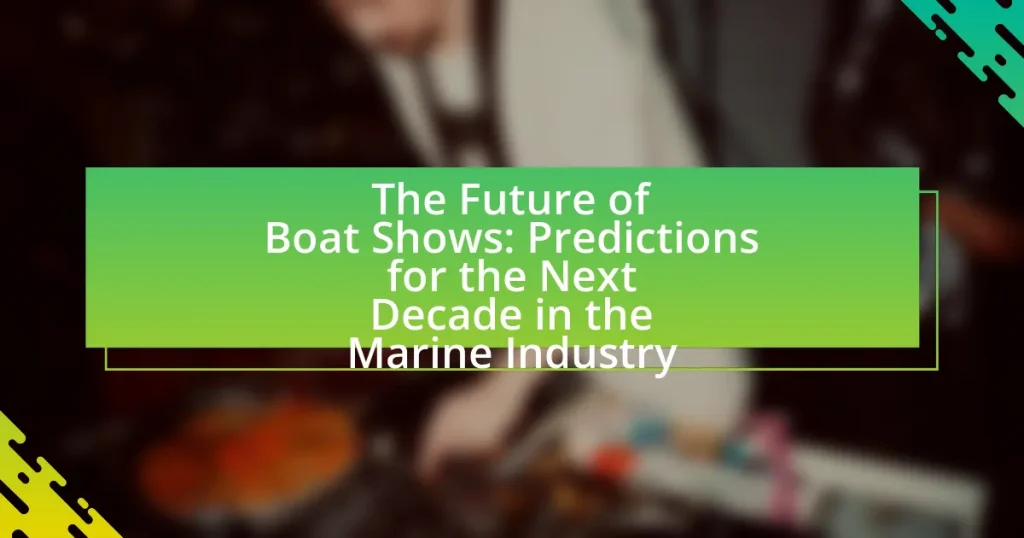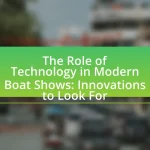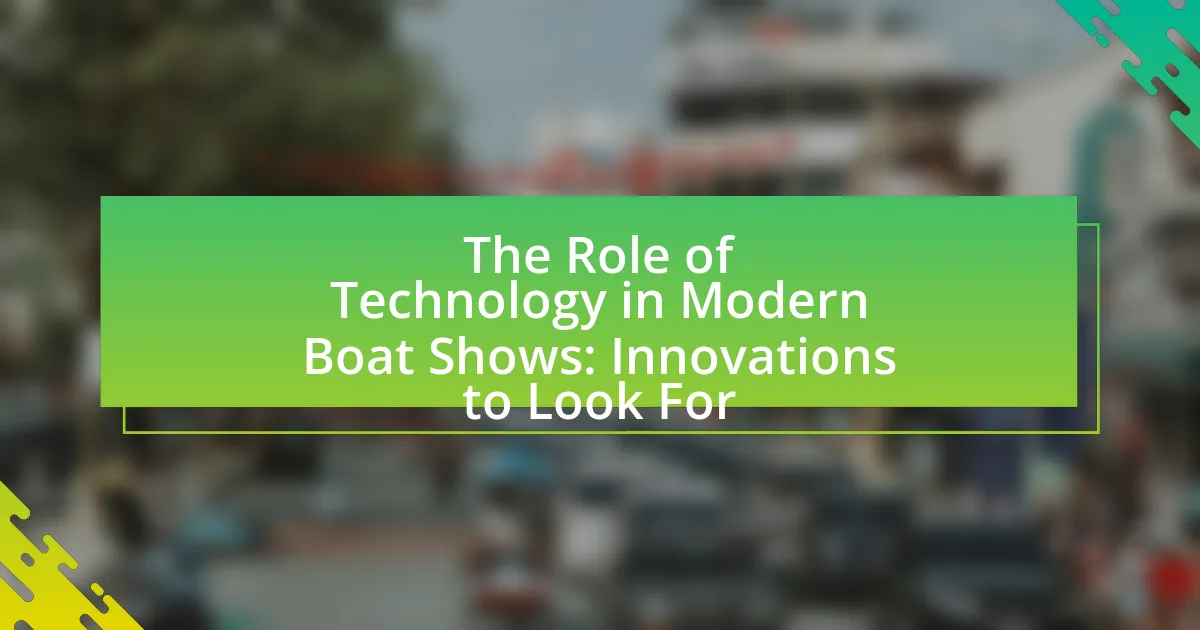The article focuses on the future of boat shows, highlighting current trends such as digital engagement, sustainability initiatives, and experiential marketing. It examines how technology, particularly virtual and augmented reality, is enhancing attendee experiences and transforming event formats through online platforms. The piece also discusses the growing emphasis on eco-friendly practices within the marine industry, including innovations in sustainable boating and changing consumer preferences towards affordability and technology integration. Additionally, it outlines strategies for exhibitors and attendees to maximize their engagement and experience at boat shows, reflecting broader demographic shifts and market trends expected in the next decade.
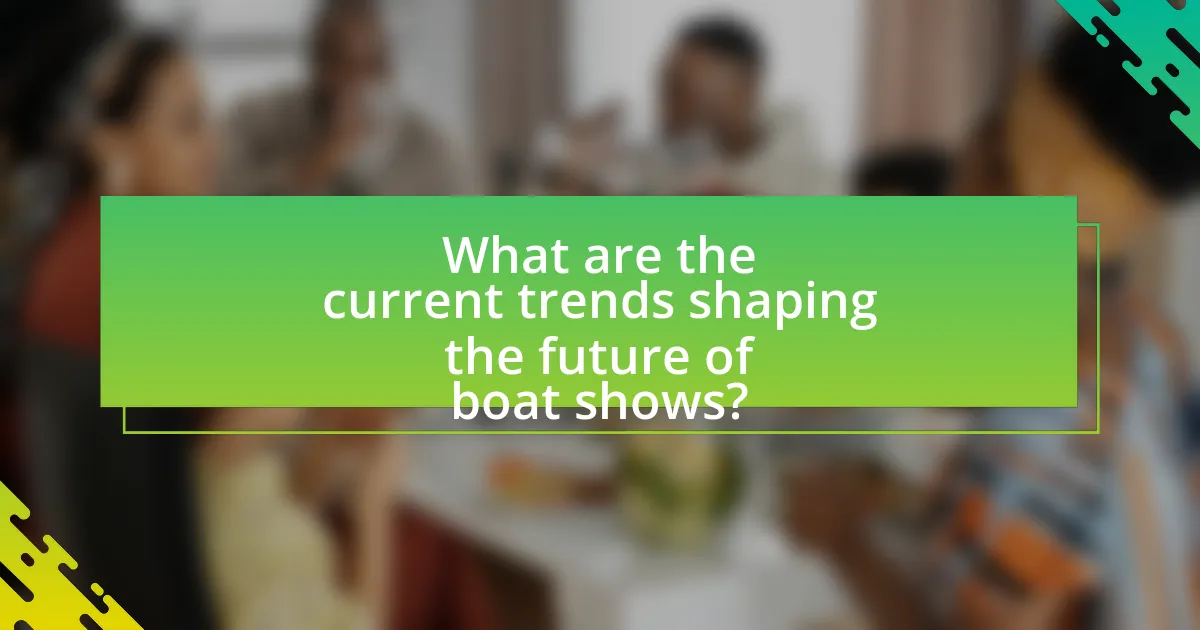
What are the current trends shaping the future of boat shows?
Current trends shaping the future of boat shows include increased digital engagement, sustainability initiatives, and experiential marketing. Digital engagement is evident as boat shows adopt virtual and hybrid formats, allowing broader participation and showcasing products online, which was accelerated by the COVID-19 pandemic. Sustainability initiatives are becoming crucial, with exhibitors focusing on eco-friendly materials and technologies, reflecting consumer demand for environmentally responsible practices. Experiential marketing is also on the rise, as shows create immersive experiences for attendees, such as interactive displays and hands-on demonstrations, enhancing visitor engagement and satisfaction. These trends are supported by industry reports indicating a shift towards more inclusive and environmentally conscious events, aligning with broader societal changes.
How is technology influencing boat show experiences?
Technology is significantly enhancing boat show experiences by integrating virtual reality, augmented reality, and mobile applications. Virtual reality allows attendees to experience boat designs and features in immersive environments, while augmented reality provides interactive displays that showcase boat specifications and functionalities in real-time. Mobile applications facilitate navigation of the show, scheduling of events, and access to detailed information about exhibitors and products. According to a report by the National Marine Manufacturers Association, 70% of boat show attendees expressed a preference for interactive technology experiences, indicating a strong demand for these innovations in the marine industry.
What role do virtual and augmented reality play in boat shows?
Virtual and augmented reality significantly enhance the experience at boat shows by providing immersive and interactive environments for attendees. These technologies allow potential buyers to visualize boats in 3D, explore features in detail, and even simulate sailing experiences without being physically present on the water. For instance, a study by the National Marine Manufacturers Association highlighted that 70% of attendees found virtual reality experiences at boat shows to be more engaging than traditional displays. This engagement can lead to increased sales and customer satisfaction, as buyers can make more informed decisions based on realistic representations of the vessels.
How are online platforms changing the way boat shows are conducted?
Online platforms are transforming boat shows by enabling virtual participation, which increases accessibility for both exhibitors and attendees. This shift allows boat manufacturers and dealers to showcase their products to a global audience without the constraints of physical space or geographical limitations. For instance, the 2021 Fort Lauderdale International Boat Show incorporated a virtual component, attracting over 100,000 online visitors, demonstrating the effectiveness of digital engagement. Additionally, online platforms facilitate interactive features such as live Q&A sessions, virtual tours, and 360-degree views of boats, enhancing the overall experience and providing detailed information that may not be available in traditional settings.
What environmental considerations are impacting boat shows?
Environmental considerations impacting boat shows include regulations on emissions, waste management, and the preservation of marine ecosystems. These regulations are increasingly stringent due to growing concerns about climate change and pollution. For instance, many boat shows are adopting sustainable practices, such as using eco-friendly materials and promoting electric or hybrid vessels, to align with environmental standards. Additionally, the need to protect marine habitats has led to restrictions on certain activities during boat shows, ensuring that the events do not harm local wildlife or water quality.
How are sustainability practices being integrated into boat shows?
Sustainability practices are being integrated into boat shows through the adoption of eco-friendly materials, energy-efficient technologies, and waste reduction initiatives. Many boat shows now feature exhibitors that showcase electric and hybrid vessels, promoting cleaner alternatives to traditional fuel-powered boats. Additionally, organizers are implementing recycling programs and encouraging the use of biodegradable products at events. For instance, the 2023 Fort Lauderdale International Boat Show highlighted over 50 exhibitors focused on sustainable boating solutions, demonstrating a significant shift towards environmental responsibility in the marine industry.
What innovations in eco-friendly boating are showcased at these events?
Innovations in eco-friendly boating showcased at these events include electric propulsion systems, solar-powered vessels, and biodegradable materials for boat construction. Electric propulsion systems significantly reduce emissions and reliance on fossil fuels, with companies like Torqeedo leading the way in electric outboard motors. Solar-powered vessels utilize photovoltaic panels to harness renewable energy, exemplified by models from manufacturers such as Silent Yachts. Additionally, the use of biodegradable materials, such as hemp and flax fibers, in boat construction is gaining traction, promoting sustainability and reducing environmental impact. These advancements reflect a growing commitment to environmentally responsible practices within the marine industry.

What predictions can be made for the next decade of boat shows?
The next decade of boat shows is expected to see a significant increase in digital integration and sustainability initiatives. As technology advances, boat shows will likely incorporate virtual reality and augmented reality experiences to enhance visitor engagement and showcase products more interactively. Additionally, the marine industry is increasingly focusing on eco-friendly practices, leading to more displays of electric and hybrid boats, as well as sustainable materials in boat construction. According to a report by the National Marine Manufacturers Association, the demand for environmentally friendly boating options has been rising, indicating a shift in consumer preferences that boat shows will need to reflect.
How will consumer preferences evolve in the marine industry?
Consumer preferences in the marine industry will increasingly shift towards sustainability and technology integration. As environmental concerns rise, consumers are prioritizing eco-friendly materials and energy-efficient vessels, with a report from the International Council on Clean Transportation indicating that electric and hybrid boats are expected to see significant growth, projected to reach 20% of the market by 2030. Additionally, advancements in technology, such as smart navigation systems and enhanced connectivity, are becoming essential features for consumers, reflecting a trend towards more integrated and user-friendly boating experiences. This evolution is driven by a younger demographic that values innovation and environmental responsibility, shaping the future landscape of the marine industry.
What demographic shifts are expected to influence boat show attendance?
Demographic shifts such as the aging population, increasing participation of younger generations, and growing diversity are expected to influence boat show attendance. The aging population, particularly baby boomers, continues to drive interest in recreational boating, as they have both the time and financial resources to invest in leisure activities. Simultaneously, younger generations, including millennials and Gen Z, are showing increased interest in experiences over possessions, which may lead to higher attendance as they seek out recreational activities like boating. Additionally, the growing diversity in the population is likely to expand the audience for boat shows, as more varied cultural backgrounds bring different perspectives and interests to the boating industry. These shifts are supported by industry reports indicating that younger consumers are increasingly engaging with outdoor activities, including boating, which suggests a potential rise in attendance at boat shows in the coming years.
How might the demand for luxury versus affordable boats change?
The demand for luxury boats may decline while the demand for affordable boats is likely to increase. Economic factors, such as inflation and changing consumer priorities, often lead buyers to seek more cost-effective options. According to a report by the National Marine Manufacturers Association, the market for entry-level boats has seen growth, indicating a shift towards affordability in consumer preferences. Additionally, the rise of younger, budget-conscious buyers is contributing to this trend, as they prioritize experiences over luxury purchases.
What advancements in boat design and technology can we expect?
Advancements in boat design and technology will focus on sustainability, automation, and enhanced materials. The marine industry is increasingly adopting electric propulsion systems, which reduce emissions and fuel consumption, as evidenced by the growing number of electric and hybrid vessels launched in recent years. Additionally, advancements in materials such as lightweight composites and advanced hull designs will improve fuel efficiency and performance. Automation technologies, including autonomous navigation systems, are also being integrated into new designs, enhancing safety and operational efficiency. These trends reflect a broader shift towards environmentally friendly and technologically advanced solutions in the marine sector.
How will smart technology be integrated into new boat models?
Smart technology will be integrated into new boat models through advanced automation, connectivity, and user-friendly interfaces. Manufacturers are incorporating systems such as IoT sensors for real-time monitoring of engine performance, fuel efficiency, and onboard systems, enhancing operational efficiency and safety. Additionally, features like integrated navigation systems with augmented reality and mobile app connectivity allow users to control various functions remotely, improving the overall boating experience. This integration is supported by industry trends indicating that 70% of boat buyers prioritize technology features, reflecting a growing demand for smart solutions in marine design.
What future trends in boat manufacturing will be highlighted at shows?
Future trends in boat manufacturing that will be highlighted at shows include the increased use of sustainable materials, advancements in electric propulsion systems, and the integration of smart technology for enhanced user experience. Sustainable materials, such as recycled plastics and bio-based composites, are gaining traction as manufacturers aim to reduce environmental impact. Electric propulsion systems are becoming more prevalent, with a projected growth rate of 23% annually in the electric boat market, driven by consumer demand for eco-friendly alternatives. Additionally, smart technology, including IoT devices and automation, is being incorporated into boat designs to improve navigation, safety, and onboard comfort, reflecting the industry’s shift towards innovation and sustainability.
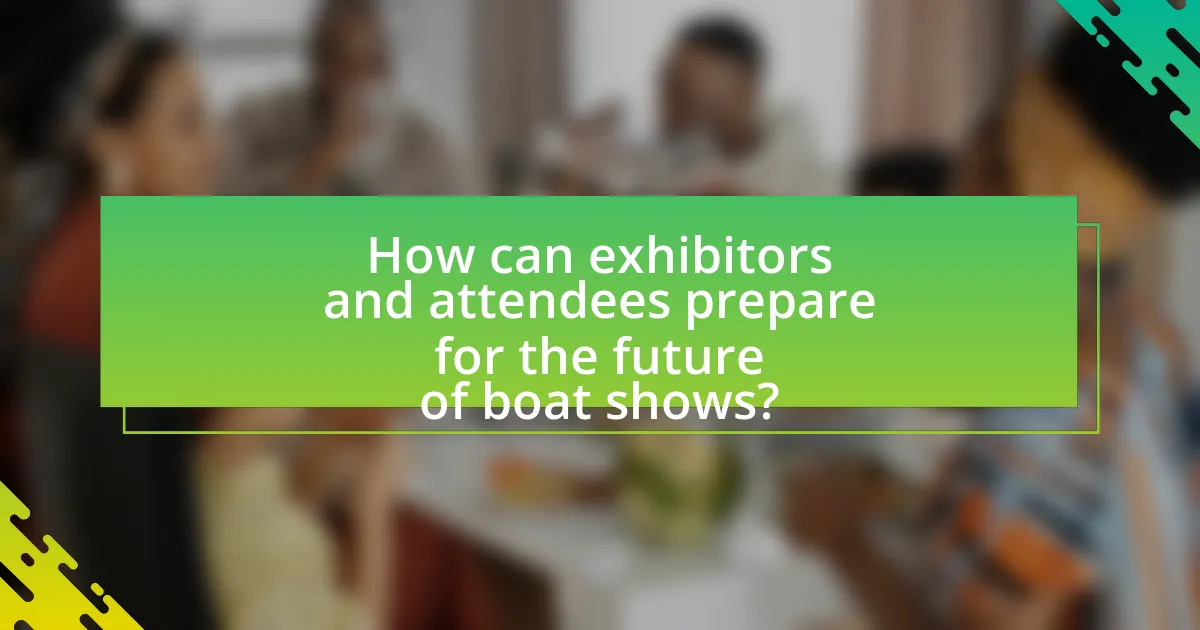
How can exhibitors and attendees prepare for the future of boat shows?
Exhibitors and attendees can prepare for the future of boat shows by embracing digital technologies and enhancing their engagement strategies. Exhibitors should invest in virtual reality and augmented reality tools to create immersive experiences that showcase their products effectively, as studies indicate that 70% of consumers prefer interactive content over static presentations. Attendees can benefit from utilizing mobile apps that provide real-time information about exhibitors, schedules, and networking opportunities, which can enhance their overall experience. Additionally, both groups should focus on sustainability practices, as the marine industry is increasingly prioritizing eco-friendly solutions, with 80% of consumers expressing a preference for brands that demonstrate environmental responsibility.
What strategies should exhibitors adopt to stand out in future boat shows?
Exhibitors should adopt innovative technology and interactive experiences to stand out in future boat shows. Utilizing virtual reality (VR) and augmented reality (AR) can enhance visitor engagement by allowing potential customers to experience boats in immersive environments. For instance, a study by the National Marine Manufacturers Association indicates that interactive displays can increase booth traffic by up to 30%. Additionally, personalized marketing strategies, such as targeted email campaigns and social media engagement, can help exhibitors connect with attendees before and after the event, fostering stronger relationships. Implementing sustainable practices, such as showcasing eco-friendly products and practices, can also attract environmentally conscious consumers, aligning with the growing trend towards sustainability in the marine industry.
How can exhibitors leverage digital marketing to enhance visibility?
Exhibitors can leverage digital marketing to enhance visibility by utilizing targeted online advertising, social media engagement, and content marketing strategies. Targeted online advertising, such as Google Ads and Facebook Ads, allows exhibitors to reach specific demographics interested in marine products, increasing the likelihood of attracting relevant visitors. Social media platforms, including Instagram and LinkedIn, enable exhibitors to showcase their offerings through engaging visuals and interactive content, fostering community engagement and brand loyalty. Additionally, content marketing, through blogs and videos, can educate potential customers about products and industry trends, establishing the exhibitor as a thought leader. According to a report by Statista, 79% of consumers prefer to engage with brands that provide personalized experiences, highlighting the effectiveness of tailored digital marketing efforts in enhancing visibility.
What are the best practices for engaging with attendees at boat shows?
The best practices for engaging with attendees at boat shows include creating interactive experiences, utilizing technology for enhanced engagement, and providing knowledgeable staff for inquiries. Interactive experiences, such as virtual reality boat tours or hands-on demonstrations, captivate attendees and encourage participation. Technology, like mobile apps for event navigation and real-time updates, enhances the visitor experience by providing valuable information and facilitating connections. Knowledgeable staff are essential, as they can effectively communicate product features and answer questions, fostering a deeper connection with potential customers. These practices are supported by industry trends indicating that engagement through technology and personal interaction significantly increases attendee satisfaction and interest in products.
What tips can attendees follow to maximize their boat show experience?
To maximize their boat show experience, attendees should plan their visit in advance by researching exhibitors and creating a schedule. This preparation allows attendees to prioritize specific boats and products of interest, ensuring they do not miss key displays. Additionally, engaging with industry experts and participating in seminars can provide valuable insights into trends and innovations in the marine industry. Attendees should also take advantage of networking opportunities to connect with other boating enthusiasts and professionals, which can lead to future collaborations or purchases. Lastly, utilizing social media to share experiences and gather information can enhance the overall experience, as many boat shows encourage online engagement.
How can attendees effectively plan their visit to a boat show?
Attendees can effectively plan their visit to a boat show by researching the event schedule, identifying key exhibitors, and setting specific goals for their visit. Researching the event schedule allows attendees to prioritize which days to attend based on featured presentations or activities. Identifying key exhibitors helps attendees focus on brands or products of interest, ensuring they maximize their time. Setting specific goals, such as networking with industry professionals or exploring particular types of boats, provides direction and enhances the overall experience. These strategies are supported by the fact that organized attendees often report higher satisfaction and engagement levels at trade shows, as noted in industry studies.
What key questions should attendees ask exhibitors for informed decisions?
Attendees should ask exhibitors about product specifications, pricing, warranty options, and after-sales support to make informed decisions. Understanding the technical details of the products ensures compatibility with their needs, while inquiring about pricing helps attendees assess budget alignment. Warranty options provide insight into the manufacturer’s confidence in their product, and after-sales support is crucial for long-term satisfaction. These questions are essential as they directly impact the attendee’s purchasing decision and overall experience in the marine industry.
